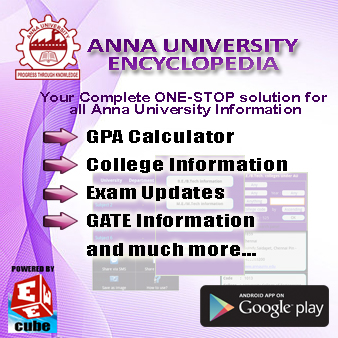SUBJECT RESOURCES:
CLICK HERE to access 'Question Banks'
CLICK HERE to access 'Previous Year Question Papers'
CLICK HERE to search more about this subject
SYLLABUS:
CLICK HERE to access 'Question Banks'
CLICK HERE to access 'Previous Year Question Papers'
CLICK HERE to search more about this subject
SYLLABUS:
HS2161 TECHNICAL ENGLISH II L T P C
3 1
0 4
AIM:
To encourage students to actively involve in participative learning of English and to help them acquire Communication Skills.
OBJECTIVES:
1. To help students develop listening skills for academic and professional purposes.
2. To help students acquire the ability to speak effectively in English in real-life situations.
3. To inculcate reading habit and to develop effective reading skills.
4. To help students improve their active and passive vocabulary.
5. To familiarize students with different rhetorical functions of scientific English.
6. To enable students write letters and reports effectively in formal and business situations.
UNIT I 12
Technical Vocabulary - meanings in context, sequencing words, Articles- Prepositions, intensive
reading& predicting content, Reading and interpretation, extended definitions, Process description
SUGGESTED ACTIVITIES:
1. Exercises on word formation using the prefix ‘self’ - Gap filling with preposition.
2. Exercises -
Using sequence words.
3. Reading comprehension exercise with questions based on inference – Reading headings
4. and predicting the content – Reading advertisements and interpretation.
5. Writing extended definitions – Writing descriptions of processes – Writing paragraphs based on discussions – Writing paragraphs describing the future.
UNIT II 12
Phrases / Structures indicating use / purpose – Adverbs-Skimming – Non-verbal communication
- Listening – correlating verbal and non-verbal communication -Speaking in group discussions –
Formal Letter
writing – Writing analytical paragraphs.
SUGGESTED ACTIVITIES:
Reading comprehension exercises with questions on overall content – Discussions analyzing stylistic features (creative and factual description) - Reading comprehension exercises with texts including graphic communication - Exercises in interpreting non-verbal communication.
1. Listening comprehension exercises to categorise data in tables.
2. Writing formal letters, quotations,
clarification, complaint
–
Letter seeking
permission for
Industrial visits– Writing analytical paragraphs on different debatable issues.
UNIT III 12
Cause and effect expressions – Different grammatical forms of the same word - Speaking – stress
and
intonation,
Group
Discussions
-
Reading –
Critical
reading -
Listening, - Writing – using
connectives, report writing – types, structure, data collection, content, form, recommendations .
SUGGESTED ACTIVITIES:
Exercises combining sentences using cause and effect expressions – Gap filling exercises using the appropriate tense forms – Making sentences using different grammatical forms of the same word.
( Eg: object –verb / object – noun )
1. Speaking exercises involving the use of stress and intonation – Group discussions– analysis of problems and offering solutions.
2. Reading comprehension exercises with critical questions, Multiple choice question.
3. Sequencing of jumbled sentences using connectives – Writing different types of reports like
industrial
accident report and survey report – Writing recommendations.
UNIT IV 12
Numerical adjectives
– Oral instructions
– Descriptive writing – Argumentative paragraphs – Letter
of application - content,
format (CV /
Bio-data) - Instructions, imperative forms - Checklists, Yes/No question form – E-mail
communication.
SUGGESTED ACTIVITIES:
1. Rewriting exercises using numerical adjectives.
2. Reading comprehension exercises with analytical questions on content – Evaluation of content.
3. Listening comprehension – entering information in tabular form, intensive listening exercise
and completing the steps of a process.
4. Speaking -
Role play – group discussions – Activities giving oral instructions.
5. Writing descriptions, expanding hints – Writing argumentative paragraphs – Writing formal
letters – Writing letter
of
application with CV/Bio-data – Writing general
and safety instructions
– Preparing checklists – Writing e-mail messages.
UNIT V 9
Speaking - Discussion of Problems and solutions - Creative and critical thinking – Writing an essay,
Writing a proposal.
SUGGESTED ACTIVITIES:
1. Case Studies on problems and solutions
2. Brain storming and discussion
3. Writing Critical
essays
4. Writing short proposals of 2 pages for
starting a project, solving problems, etc.
5. Writing advertisements.
TOTAL: 60 PERIODS
TEXT BOOKS:
1. Chapters 5 – 8. Department of Humanities & Social Sciences, Anna University, ‘English for
Engineers and Technologists’
Combined Edition (Volumes 1 & 2), Chennai: Orient Longman Pvt. Ltd., 2006. Themes 5 – 8 (Technology, Communication, Environment, Industry)
REFERENCES:
1. P. K. Dutt, G. Rajeevan and C.L.N Prakash, ‘A Course in Communication Skills’, Cambridge
University Press, India 2007.
2. Krishna Mohan and Meera Banerjee, ‘Developing Communication Skills’, Macmillan India Ltd.,
(Reprinted 1994 – 2007).
3. Edgar
Thorpe, Showick Thorpe, ‘Objective English’, Second Edition, Pearson Education, 2007.
EXTENSIVE READING:
1. Robin Sharma, ‘The Monk Who Sold His Ferrari’, Jaico Publishing House, 2007
Note:
The book listed under
Extensive Reading is meant for inculcating the reading habit of the students.
They
need not be used for testing purposes.
|
|










No comments:
Post a Comment
Note: Only a member of this blog may post a comment.